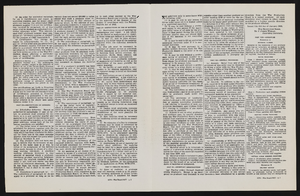Search the Special Collections and Archives Portal
Search Results

Transcript of interview with Eva Garcia Mendoza by Elsa Lopez and Barbara Tabach, September 25, 2018
Date
Archival Collection
Description
On the corner of 7th street and Clark, and beside the tennis courts of Las Vegas Academy, stands the law office of attorney Eva Garcia Mendoza. Eva has worked in her office since 1982, and in this time she has helped the Las Vegas community work through civil and immigration cases besides aiding in a myriad of other ways. Eva Garcia Mendoza was born in 1950, in the town of McAllen, TX-an environment that perpetuated hatred of Mexican Americans. Eva recalls the racism she endured; for instance, being spanked if she spoke Spanish in school, and her family facing job discrimination because of her skin color or her last name. Being an ethnic and financial minority was difficult, and Eva remembers nights as a child when she would cry herself to sleep. Eva showed resilience in the face of adversity as she states, “you rise to the level of your teachers’ expectations.” With the encouragement of her band professor, Dr. L.M Snavely, she began higher education at Pan American College. She moved to Las Vegas in 1971 and began to work before being accepted at UNLV to study Spanish literature. She graduated in the class of 1973. In 1975, Eva applied to become a court interpreter, a decision that would drastically change the trajectory of her career. She earned the coveted position and began to work beside Judge John Mendoza who was the first Latino elected to public office in the state of Nevada. Several years later John and Eva would wed. Judge Mendoza passed away in 2011. Eva talks about how extraordinary his legacy is-from his professional achievements to a story about his v football days and the 1944 Dream Team, this true story even piqued the interest of Hollywood writers. Through her work, Eva began to notice how she was more than qualified to become a lawyer herself, so she applied and gained a full ride scholarship to the Law School of San Diego University. Eva describes the struggles of attending school in San Diego while her spouse and children were home in Las Vegas. Despite the financial difficulties, being one of few minority students, and becoming pregnant her second year, Eva was able to finish her remaining university credits by returning to Las Vegas and working with Judge Mendoza. Together, they started the Latin Bar Association. Eva began her own practice in 1981 and would later partner with Luther Snavely, who was the son of her band teacher that helped her to attend college so many years back. Today, Eva has a new partner at her office and hired her son to work as a secretary. Eva also tells of the office’s mysterious history, of which includes a ghostly figure many clients claimed to have seen in the reception room. Eva recounts many of her professional achievements, such as petitioning to start the American Immigration Lawyers Association, Nevada Chapter, representing celebrities, winning the unwinnable cases such as against the Nevada Test Site. Eva talks about current events, such as today’s immigration laws, the discriminatory practices of revoking birth certificates from those born in Brownsville, TX., and about the importance of the #MeToo movement. Eva and her family have a great fondness for Las Vegas. The support for the Latinx community in Las Vegas greatly contrasts that which she experienced as a child in southern Texas. She describes wanting to take her children and grandchildren to visit her old home in McAllen, TX where her family grew up on the “wrong side of the tracks.”
Text

Daniel A. Moore interview, March 3, 1979: transcript
Date
Archival Collection
Description
On March 3, 1979, Norwood Germany Jr. interviewed Daniel A. Moore (b. 1939 in Fort Worth, Texas) about his life in Las Vegas, Nevada. Moore begins by speaking about his move to Las Vegas from Utah at a young age, his education and his work in construction and at the Las Vegas McCarran Airport. Moreover, Moore speaks about his involvement with church and his recreational hobbies such as bowling. Moore also spends time speaking about the African American population in Las Vegas, the jobs available to them, racial tensions in his young adulthood versus his children’s experiences, and the segregation of black communities into the Las Vegas Westside. Lastly, he talks about the city’s growth, tourism and the economy, the development of different shopping centers and malls, and the city’s law enforcement.
Text

Kaity Webber oral history interview: transcript
Date
Archival Collection
Description
Oral history interview with Kaity Webber conducted by Barbara Tabach on November 16, 2017 for the Remembering 1 October Oral History Project. Kaity Webber describes moving to Las Vegas, Nevada and earning her degree in psychology from the University of Nevada, Las Vegas. Webber discusses the excitement she had going to the Route 91 Harvest festival with a friend on the weekend of the October 1, 2017 Las Vegas shooting. She talks about her experiences from that night, including how she found shelter in the Thomas & Mack Center with countless others, as well as her process of healing from the traumatic event.
Text

Lily Teo oral history interview: transcript
Date
Archival Collection
Description
Oral history interview with Lily Teo conducted by Stefani Evans on February 7, 2022 for Reflections: The Las Vegas Asian American and Pacific Islander Oral History Project. Lily Teo discusses her upbringing in Singapore, her education, her religious beliefs, and converting from Buddhism to Catholicism. She talks about her husband, her early married years, and what life was like as a young mother of three children. Teo shares how she started a catering business to feed construction workers and was responsible for shopping for ingredients, preparing all meals and tea, and cooking the food on site in her temporary kitchen. She talks about her children, the faiths they practice and languages they speak including English, Malay, and Mandarin, and the customs and traditions they practice, such as celebrating Lunar New Year and other holidays. Lily's daughter, Stella, sits in on the interview and expands on her mother's recollections.
Text

Joy Rineer oral history interview: transcript
Date
Archival Collection
Description
Oral history interview with Joy Rineer conducted by Claytee D. White on December 07, 2017 for the Remembering 1 October Oral History Project. In this interview, Rineer discusses her upbringing in Las Vegas, Nevada. She describes her career as an architect, designing the Resilience Center for those affected by the 1 October shooting, and the city’s response to the shooting. Later, Rineer describes helping the grief-stricken city through architecture, establishing the Leadership Las Vegas program, and organizing blood drives. Lastly, Rineer discusses the changes in Las Vegas after the tragedy.
Text

Joseph Ostunio oral history interview: transcript
Date
Archival Collection
Description
Oral history interview with Joseph Ostunio conducted by Claytee D. White on December 20, 2017 for the Remembering 1 October Oral History Project. In this interview, Joseph Ostunio discusses his early childhood in Las Vegas, Nevada and how he grew to love country music. He talks about the Route 91 Harvest music festival, which he attended with his friend in 2017. He describes the events of that weekend and the shooting on that Sunday, October 1, 2017, during which his friend was shot. Ostunio ends the interview with his feelings regarding Las Vegas and what he has learned about himself from this experience.
Text

Elena Newman oral history interview: transcript
Date
Archival Collection
Description
Oral history interview with Elena Newman conducted by Cecilia Winchell and Stefani Evans on April 11, 2022 for the Reflections: the Las Vegas Asian American and Pacific Islander Oral History Project. In this interview, Newman discusses her childhood in Dagupan, Pangasinan, Philippines. At the age of eighteen, she moved to Singapore for better work opportunities to help support her family. After meeting her husband, the couple moved to Las Vegas, Nevada. Since moving to Las Vegas, Newman has spent her time working as both a guest room attendant and shop steward at Mandalay Bay. She is also a part of the Culinary Workers Union, and she discusses how helpful the union is to the livelihoods of the many workers in the casino industry.
Text

Cristina Alano oral history interview: transcript
Date
Archival Collection
Description
Oral history interview with Cristina Alano conducted by Cecilia Winchell and Stefani Evans on September 9, 2022 for the Reflections: The Las Vegas Asian American and Pacific Islander Oral History Project. In this interview, Alano recalls a happy childhood in Pampanga, Philippines. After attending college for a banking and finance degree, she briefly worked at a bank before marrying her husband and immigrating to the United States. She would go on to move to Colorado where she lived for seven years, and finally moving to Las Vegas, Nevada in 2003. Alano recalls her first jobs in Las Vegas, including Walmart, SEI Electronics, a cashier at the Riviera, and finally the airport where works as a supervisor at Hudson as well as an assistant manager at Brighton. She discusses what she has done at each job and how she ended up getting involved with the Culinary Union in 2016. Since joining the union, she has done everything from being a shop steward to canvassing, most recently flying down to Georgia to help campaign for Senator Warnock. Throughout the rest of the interview, she discusses everything from food, to festivals, and her family.
Text

Nadine Cracraft oral history interview: transcript
Date
Archival Collection
Description
Oral history interview with Nadine Cracraft conducted by Barbara Tabach on November 27, 2017 for the Remembering 1 October Oral History Project. In this interview, Nadine Cracraft discusses the development of her career in child and family therapy after moving to Las Vegas, Nevada in 1991. While describing the work she has done, Cracraft talks about the volunteer counseling services she provided for the survivors of the October 2017 Las Vegas mass shooting. She specifically mentions working with Aria staff members who were struggling with the aftermath of the shooting as well as her time spent working with First Friday to help those impacted by the traumatic event. Throughout the interview, Cracraft explains the different ways people manage their post-traumatic stress disorder and how this knowledge influenced her care of the survivors.
Text

